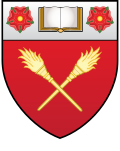| Main page | Indices | Projects |
The University of Oxford portal
The University of Oxford is a collegiate research university in Oxford, United Kingdom. There is evidence of teaching as early as 1096, making it the oldest university in the English-speaking world and the world's second-oldest university in continuous operation. It grew rapidly from 1167, when Henry II banned English students from attending the University of Paris. After disputes between students and Oxford townsfolk, some Oxford academics fled northeast to Cambridge, where, in 1209, they established the University of Cambridge. The two English ancient universities share many common features and are jointly referred to as Oxbridge.
The University of Oxford is made up of 43 constituent colleges, consisting of 36 semi-autonomous colleges, four permanent private halls and three societies (colleges that are departments of the university, without their own royal charter), and a range of academic departments which are organised into four divisions. Each college is a self-governing institution within the university, controlling its own membership and having its own internal structure and activities. All students are members of a college. The university does not have a main campus, but its buildings and facilities are scattered throughout the city centre. Undergraduate teaching at Oxford consists of lectures, small-group tutorials at the colleges and halls, seminars, laboratory work and occasionally further tutorials provided by the central university faculties and departments. Postgraduate teaching is provided in a predominantly centralised fashion.
Oxford operates the Ashmolean Museum, the world's oldest university museum; Oxford University Press, the largest university press in the world; and the largest academic library system nationwide. In the fiscal year ending 31 July 2023, the university had a total consolidated income of £2.92 billion, of which £789 million was from research grants and contracts.
Oxford has educated a wide range of notable alumni, including 31 prime ministers of the United Kingdom and many heads of state and government around the world. 73 Nobel Prize laureates, 4 Fields Medalists, and 6 Turing Award winners have matriculated, worked, or held visiting fellowships at the University of Oxford, while its alumni have won 160 Olympic medals. Oxford is the home of numerous scholarships, including the Rhodes Scholarship, one of the oldest international graduate scholarship programmes. (Full article...)
Selected article
The university's position of Keeper of the Archives dates from 1634, although its records pre-date this, and Oxford claims to have one of the longest continuous record-keeping traditions in Britain. Records were initially kept in the Priory of St Frideswide, moving to the University Church of St Mary the Virgin in the 14th century. The archives were left in considerable disarray by a burglary in 1544, and remained in chaos until Brian Twyne was appointed the first Keeper of the Archives in 1634 as a reward for his work preparing new statutes for the university. Under Twyne and his successor as Keeper (Gerard Langbaine), the archives were moved into one of the rooms in the Tower of the Five Orders in the Bodleian Library; three of the wooden presses that were built at that time to store them are still in use. The third to hold the position, John Wallis (pictured), prepared an index of the collection that was still used in the 20th century. (Full article...)
Selected biography
Selected college or hall
Harris Manchester College, on Mansfield Road just to the east of the city centre, was established in 1786 in Manchester, and was initially called the Manchester Academy. It provided education to religious non-conformists who at that time were not allowed to study at the universities of Oxford or Cambridge. Between 1803 and 1840, the academy was based in York to accommodate its principal, Charles Wellbeloved, who would not move to Manchester. After a period in London (1853 to 1889), it moved to Oxford, with buildings designed by the architect Thomas Worthington opening in 1893. The chapel has ornate wood carvings and notable stained-glass windows by Sir Edward Burne-Jones and William Morris. It became a Permanent Private Hall of the university in 1990, and gained full college status in 1996. The college's name reflects its history in Manchester and a donation from Lord Harris of Peckham. It has about 110 undergraduate students and 40 postgraduates, all of whom are mature students (over 21), and is one of the smallest colleges at Oxford; the Principal is the theologian Ralph Waller, who is also Director of the Farmington Institute for Christian Studies which is based at the college. (Full article...)
Selected image

Did you know
Articles from Wikipedia's "Did You Know" archives about the university and people associated with it:
- ... that before Charles Aitken installed electric lighting, the Tate Gallery (pictured) was cleared of visitors on dark and foggy days?
- ... that in 1964 J. N. L. Baker, Bursar of Jesus College, became the first member of the university to hold the post of Lord Mayor of Oxford?
- ... that although George Bernard Shaw called fellow Edwardian playwright St John Hankin's death "a public calamity," his work was largely neglected until the 1990s?
- ... that "many-sided" priest Father Patrick McLaughlin promoted links between the church and the world of literature by staging plays, and by commissioning lectures from T. S. Eliot and Dorothy L. Sayers?
- ... that in 1612 Jewish teacher Jacob Barnet was arrested and imprisoned by officials of the university for changing his mind about being baptized?
Selected quotation
Selected panorama
On this day
Events for 16 July relating to the university, its colleges, academics and alumni. College affiliations are marked in brackets.
|
Births
|
Deaths
|
Wikimedia
The following Wikimedia Foundation sister projects provide more on this subject:
-
Commons
Free media repository -
Wikibooks
Free textbooks and manuals -
Wikidata
Free knowledge base -
Wikinews
Free-content news -
Wikiquote
Collection of quotations -
Wikisource
Free-content library -
Wikiversity
Free learning tools -
Wikivoyage
Free travel guide -
Wiktionary
Dictionary and thesaurus














